Brussels, 24 January 2020
What's new in Brussels? Recent developments in European policies and programmes
Theme
Most ACA events have a thematic focus. This is also the case with ACA’s flagship European Policy Seminar What’s new in Brussels? But the ‘theme’ is somewhat differently defined. It is simply what is new in European policies and programmes. The big news item for the community of international educators is the future Erasmus Programme (2021-2027). What’s new in Brussels? will zoom in on the future Erasmus, but it will also present news and novelties from the present incarnation of Erasmus.
- Blended student and staff mobility
- New ways of managing European and international credit mobility
- Automatic recognition
- Erasmus without papers
- The new Europass and e-credentials
- The new KA2: partnerships for cooperation, partnerships for innovation and partnerships for excellence
- Synergies between the future Erasmus Programme and Horizon Europe
- Sustainable Erasmus: the programme’s carbon footprint and how to reduce it
- Inclusive Erasmus and the
- First experiences with the European Universities Initiative and with national co-founding schemes.
Programme
Options
Thursday 23 January 2020
- 17:30 An out of the ordinary guided tour with Derek Blyth (max. 15 participants, pre-registration required)
Local writer and journalist Derek Blyth (author of the bestselling guide The 500 Hidden Secrets of Brussels) has teamed up with ACA for the past four years to offer a walking tour of Brussels that sets out to reveal some secret and surprising spots. Lasting 90 minutes, this informal urban ramble aims to highlight offbeat places that make Brussels unique, from hidden alleys and eccentric architecture to authentic Belgian cafes. Be sure to wear sturdy shoes (for the cobblestones) and bring along an umbrella.
- 19:00 Seminar dinner (the restaurant will be communicated separately)
Seminar
Friday 24 January 2020
| 8:30 | Registration and coffee |
| 9:00 | Welcome and Introduction Bernd Wächter, Director, ACA |
| 9:15 |
Opening keynote
Key challenges for European higher education in the 2020s Robert Coelen, Centre for Internationalisation of Education at University of Applied Sciences, Leeuwarden and University of Groningen |
| 10:00 | New approaches in KA1 in Erasmus 2021-2027 Marija Mitić, (moderator) ACA Elena Tegovska, DG EAC European Commission Harpa Sif Arnarsdottir, DG EAC European Commission Adrian Veale, DG EAC European Commission |
| 11:00 | Coffee break |
| 11:30 | New approaches in KA2 in Erasmus 2021-2027 Marija Mitić, ACA (moderator) Elena Tegovska, DG EAC*, European Commission Harpa Sif Arnarsdottir, DG EAC*, European Commission Adrian Veale, DG EAC*, European Commission |
| 12:00 | Digitalisation in Erasmus: Erasmus without paper Amanda Crameri, Movetia (moderator) Paul Leys, Ghent University |
| 12:30 | Digitalisation in Erasmus: the new Europass and e-credentials Amanda Crameri, Movetia (moderator) William O’Keeffe, DG EMPL**, European Commission |
| 13:00 | Lunch |
| 14:00 | Synergies between policies for higher education and research, as well as links between programmes and projects in these and other areas Irina Ferencz, ACA (moderator) Claire Morel, DG EAC*, European Commission |
| 14:30 |
Parallel session 1: Erasmus goes ‘green’
Ragnhild Solvi Berg, Diku (moderator) Christelle Coët-Amette, Agence Erasmus+ France Parallel session 2: Inclusion in Erasmus
Irina Ferencz, ACA (moderator) Markus Symmank, DAAD |
| 15:45 |
Coffee break
|
| 16:00 |
European Universities Initiative: diverse models for the future programme
Bernd Wächter, ACA (moderator) Vanessa Debiais-Sainton, DG EAC*, European Commission (input speech) Anna Sadecka, University of Warsaw, 4EUplus alliance Olga Wessels, European Consortium of Innovative Universities Nina Salden, DAAD |
| 17:00 |
Thanks and goodbye
|
Speakers
Bernd Wächter
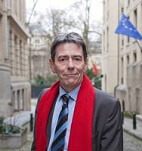 Bernd Wächter is the Director of the Academic Cooperation Association (ACA). He studied at the universities of Hull (UK), Giessen and Marburg (Germany). His career has been focused on international higher education. He worked for the University of Kassel, the British Council, and the Fachhochschule Darmstadt, before joining The German Academic Exchange Service (DAAD) as the head of their EU division.He subsequently became the director for Higher Education (Erasmus) in the Brussels Socrates Office. In 1998, he took up his present post as ACA Director.Bernd Wächter has published and lectured widely on international higher education. He is the editor of the ACA Papers on International Cooperation in Education. He has been the team leader of ACA’s research projects and speaks frequently at major governmental and stakeholder conferences, in Europe and beyond, on the issue of mobility and internationalisation. Bernd Wächter has two children. He is married to Thora Magnusdottir, a delightful lady from Iceland.
Bernd Wächter is the Director of the Academic Cooperation Association (ACA). He studied at the universities of Hull (UK), Giessen and Marburg (Germany). His career has been focused on international higher education. He worked for the University of Kassel, the British Council, and the Fachhochschule Darmstadt, before joining The German Academic Exchange Service (DAAD) as the head of their EU division.He subsequently became the director for Higher Education (Erasmus) in the Brussels Socrates Office. In 1998, he took up his present post as ACA Director.Bernd Wächter has published and lectured widely on international higher education. He is the editor of the ACA Papers on International Cooperation in Education. He has been the team leader of ACA’s research projects and speaks frequently at major governmental and stakeholder conferences, in Europe and beyond, on the issue of mobility and internationalisation. Bernd Wächter has two children. He is married to Thora Magnusdottir, a delightful lady from Iceland.
Robert Coelen
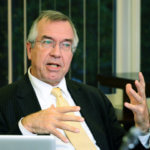 Robert is Professor of Internationalisation of Higher Education at NHL Stenden University of Applied Sciences in the Netherlands and Director of the Centre for Internationalisation of Education at the Campus Fryslân, University of Groningen. He also holds an appointment as visiting professor at Tongji University, Shanghai, China. Prior to these appointments, he spent about 20 years as a university executive in Australia and the Netherlands concerned with internationalisation at James Cook University, The University of Queensland, Leiden University, and at NHL Stenden University of Applied Sciences. He was interim Executive Dean at Stenden University Qatar. Before his executive university roles, he was a natural sciences scholar in Australia. He is a member of the Editorial Board of the Journal of Studies in International Education and a reviewer for the Journal of Applied Research in Higher Education and other journals in the field. He is the Founding Director of the Centre for Internationalisation of Education, a collaborative project of his university and the University of Groningen. In this centre there are presently 14 PhD candidates. His latest book was co-edited with Dr Cate Gribble, entitled Internationalisation and Employability in Higher Education.
Robert is Professor of Internationalisation of Higher Education at NHL Stenden University of Applied Sciences in the Netherlands and Director of the Centre for Internationalisation of Education at the Campus Fryslân, University of Groningen. He also holds an appointment as visiting professor at Tongji University, Shanghai, China. Prior to these appointments, he spent about 20 years as a university executive in Australia and the Netherlands concerned with internationalisation at James Cook University, The University of Queensland, Leiden University, and at NHL Stenden University of Applied Sciences. He was interim Executive Dean at Stenden University Qatar. Before his executive university roles, he was a natural sciences scholar in Australia. He is a member of the Editorial Board of the Journal of Studies in International Education and a reviewer for the Journal of Applied Research in Higher Education and other journals in the field. He is the Founding Director of the Centre for Internationalisation of Education, a collaborative project of his university and the University of Groningen. In this centre there are presently 14 PhD candidates. His latest book was co-edited with Dr Cate Gribble, entitled Internationalisation and Employability in Higher Education.
Marija Mitić
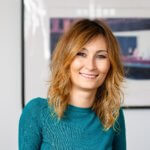 Marija Mitić is Policy Officer at ACA, where she has worked since 2014. Marija’s responsibilities at ACA include a wide variety of tasks – from membership services, project and event management, policy analysis to representation of ACA in Brussels and globally. Marija’s interest and expertise lie in intercultural learning and diversity studies, EU lifelong learning and education policies, and EU’s international cooperation in higher education, especially EU-Western Balkans relations. Marija is a big fan of Brussels, where she initially came for music, but stayed for many additional reasons, including its international setting.
Marija Mitić is Policy Officer at ACA, where she has worked since 2014. Marija’s responsibilities at ACA include a wide variety of tasks – from membership services, project and event management, policy analysis to representation of ACA in Brussels and globally. Marija’s interest and expertise lie in intercultural learning and diversity studies, EU lifelong learning and education policies, and EU’s international cooperation in higher education, especially EU-Western Balkans relations. Marija is a big fan of Brussels, where she initially came for music, but stayed for many additional reasons, including its international setting.
Elena Tegovska
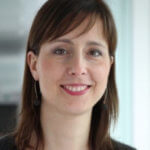 Elena leads the Erasmus+ Team within the Higher education unit, working on flagship initiatives such as the European Universities, European Student Card and Digital Opportunity scheme. Previously, she worked for the International relations office of Université Libre de Bruxelles, where she was in charge of promoting and developing European projects. She has experience as well working with the non-governmental sector and civil society organisations in the Balkans. She has a Master of Arts degree in International politics.
Elena leads the Erasmus+ Team within the Higher education unit, working on flagship initiatives such as the European Universities, European Student Card and Digital Opportunity scheme. Previously, she worked for the International relations office of Université Libre de Bruxelles, where she was in charge of promoting and developing European projects. She has experience as well working with the non-governmental sector and civil society organisations in the Balkans. She has a Master of Arts degree in International politics.
Harpa Sif Arnarsdottir
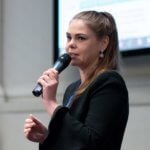 Harpa Sif Arnarsdottir worked at the International Office of the University of Iceland from 2011 until 2017 when she was seconded to the European Commission as a national expert. Harpa is currently working on the development of the next Erasmus programme and the European Education Area. Harpa has an educational background in Political Science and Public Administration.
Harpa Sif Arnarsdottir worked at the International Office of the University of Iceland from 2011 until 2017 when she was seconded to the European Commission as a national expert. Harpa is currently working on the development of the next Erasmus programme and the European Education Area. Harpa has an educational background in Political Science and Public Administration.
Adrian Veale
 Adrian Veale works for the unit in DG EAC that oversees international cooperation through Erasmus+ and other policy dialogues. He has some sixteen years of working on international higher education programmes, in EAC, in the Executive Agency, and in the DG for Development Cooperation (Asia Directorate).
Adrian Veale works for the unit in DG EAC that oversees international cooperation through Erasmus+ and other policy dialogues. He has some sixteen years of working on international higher education programmes, in EAC, in the Executive Agency, and in the DG for Development Cooperation (Asia Directorate).
Amanda Crameri
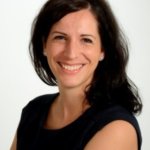 Amanda Crameri is Head of the Higher Education Sector at Movetia, the Swiss National Agency for Exchange and Mobility. She has worked at the former Swiss national Agency (CH Foundation) from 2013-2016, first as project coordinator and as Head of the Erasmus Programme in Switzerland. In 2014, she co-developed the Swiss interim solution for Erasmus+.
Amanda Crameri is Head of the Higher Education Sector at Movetia, the Swiss National Agency for Exchange and Mobility. She has worked at the former Swiss national Agency (CH Foundation) from 2013-2016, first as project coordinator and as Head of the Erasmus Programme in Switzerland. In 2014, she co-developed the Swiss interim solution for Erasmus+.
Paul Leys
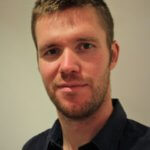 Paul Leys is working as a policy advisor at the International Relations Office at Ghent University. He is responsible for redesigning processes aiming to simplify the administrative workload that comes with student mobility. In this capacity, he plays an active role in the Erasmus Without Paper project and is involved in the European Student Card Initiative discussions at the European level. As coordinator of the eQuATIC project, he is working on data-informed decision making about international partnerships and contributes to creating awareness about the importance of quality of mobility. Paul Leys graduated as MA of Science in EU-Studies at Ghent University and started working at his alma mater soon after his graduation. After more than five years at the Office of Counselling, he joined the International Relations Office of Ghent University in May 2012.
Paul Leys is working as a policy advisor at the International Relations Office at Ghent University. He is responsible for redesigning processes aiming to simplify the administrative workload that comes with student mobility. In this capacity, he plays an active role in the Erasmus Without Paper project and is involved in the European Student Card Initiative discussions at the European level. As coordinator of the eQuATIC project, he is working on data-informed decision making about international partnerships and contributes to creating awareness about the importance of quality of mobility. Paul Leys graduated as MA of Science in EU-Studies at Ghent University and started working at his alma mater soon after his graduation. After more than five years at the Office of Counselling, he joined the International Relations Office of Ghent University in May 2012.
William O’Keeffe
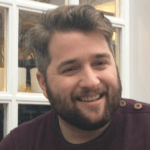 William O’Keeffe is a policy officer in the Skills and Qualifications Unit in DG Employment, Social Affairs and Inclusion. William is managing the implementation of the new Europass platform, including the European Framework for Digital Credentials. William also works on development of key transversal competences, including the European Digital Competence Framework (DigComp) and European Entrepreneurship Competence Framework (EntreComp). William is on secondment from the Irish Ministry for Education where he worked on international education, qualifications frameworks and recognition.
William O’Keeffe is a policy officer in the Skills and Qualifications Unit in DG Employment, Social Affairs and Inclusion. William is managing the implementation of the new Europass platform, including the European Framework for Digital Credentials. William also works on development of key transversal competences, including the European Digital Competence Framework (DigComp) and European Entrepreneurship Competence Framework (EntreComp). William is on secondment from the Irish Ministry for Education where he worked on international education, qualifications frameworks and recognition.
Claire Morel
 Claire Morel is currently the Head of Unit responsible for the Marie Skłodowska-Curie Actions at DG Education, Culture, Youth and Sport of the European Commission. She was earlier heading the unit responsible for the international dimension of the Erasmus+ programme and international policy dialogues in higher education and youth issues with various partners of the EU in the world. She has worked several years with the countries neighbouring the EU. Before that, she worked for the Tempus programme (for higher education modernisation), cooperating with Central Asian countries, and for the European Training Foundation, an agency of the EU based in Turin, on the reform of vocational education and training systems in the Eastern neighbouring countries and Central Asia.
Claire Morel is currently the Head of Unit responsible for the Marie Skłodowska-Curie Actions at DG Education, Culture, Youth and Sport of the European Commission. She was earlier heading the unit responsible for the international dimension of the Erasmus+ programme and international policy dialogues in higher education and youth issues with various partners of the EU in the world. She has worked several years with the countries neighbouring the EU. Before that, she worked for the Tempus programme (for higher education modernisation), cooperating with Central Asian countries, and for the European Training Foundation, an agency of the EU based in Turin, on the reform of vocational education and training systems in the Eastern neighbouring countries and Central Asia.
Ragnhild Solvi Berg
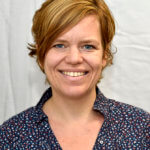 Ragnhild Solvi Berg is a senior adviser for the Norwegian Centre for International Cooperation in Higher Education (Diku) and has been working in the agency since 2004. At the time being, she is working at the recently established Norwegian Cooperation Office for Research, Innovation and Education (Norcore), as head of Diku Brussels office. From 2010-1016 Ragnhild was seconded as a national expert to the European Commission, DG Education and Culture, where she worked as a policy officer in the unit for international cooperation and programmes. She holds a master’s degree in Social Anthropology from the University of Bergen.
Ragnhild Solvi Berg is a senior adviser for the Norwegian Centre for International Cooperation in Higher Education (Diku) and has been working in the agency since 2004. At the time being, she is working at the recently established Norwegian Cooperation Office for Research, Innovation and Education (Norcore), as head of Diku Brussels office. From 2010-1016 Ragnhild was seconded as a national expert to the European Commission, DG Education and Culture, where she worked as a policy officer in the unit for international cooperation and programmes. She holds a master’s degree in Social Anthropology from the University of Bergen.
Christelle Coet-Amette
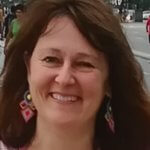
With more than 20 years of experience in European education and training projects, she is now in charge within the Agency, of coordinating and strengthening cooperation with the other national Erasmus + agencies in Europe, particularly in the context of the preparation of the future Erasmus + programme and of organizing joint conferences. She also provides informative & strategic watch in the fields of education and training at national and European level. In addition, she coordinates alongside the director, the “Cercle Erasmus”, advisory board of Erasmus + France Agency, made up of personalities committed to Europe and education.
Irina Ferencz
 Irina Ferencz (née Lungu) works for the Brussels-based Academic Cooperation Association (ACA) since 2008, currently as Deputy Director, having served in various roles previously. Through her research, publications and project management at ACA, Irina has developed a specific interest and expertise in the area of international student and staff mobility in the European context (data collections, trends, policies), as well as in planning, monitoring and assessing internationalisation activities at institutional and national level (strategic development and enhancement, KPIs, benchmarking, etc.). Currently, she is also: a PhD candidate at Ghent University, Center for Higher Education Governance Ghent (CHEGG), researching internationalisation and organisational identity in higher education; an occasional reviewer for two higher education journals; and a member of the Publications Committee of the European Association for International Education (EAIE). Irina holds an MSc degree in European Politics and Policies (KU Leuven, Belgium) and a Bachelor’s degree in International Relations and European Studies (Universitatea Babeş-Bolyai, Romania). She is a Romanian national, speaks several languages, including ‘Larish’ (a language of the under-two-year-olds), and calls Belgium ‘home’.
Irina Ferencz (née Lungu) works for the Brussels-based Academic Cooperation Association (ACA) since 2008, currently as Deputy Director, having served in various roles previously. Through her research, publications and project management at ACA, Irina has developed a specific interest and expertise in the area of international student and staff mobility in the European context (data collections, trends, policies), as well as in planning, monitoring and assessing internationalisation activities at institutional and national level (strategic development and enhancement, KPIs, benchmarking, etc.). Currently, she is also: a PhD candidate at Ghent University, Center for Higher Education Governance Ghent (CHEGG), researching internationalisation and organisational identity in higher education; an occasional reviewer for two higher education journals; and a member of the Publications Committee of the European Association for International Education (EAIE). Irina holds an MSc degree in European Politics and Policies (KU Leuven, Belgium) and a Bachelor’s degree in International Relations and European Studies (Universitatea Babeş-Bolyai, Romania). She is a Romanian national, speaks several languages, including ‘Larish’ (a language of the under-two-year-olds), and calls Belgium ‘home’.
Markus Symmank
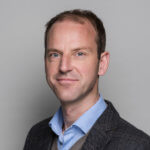 Since very recently (January 2020) Markus has been working at DAAD (Bonn) as Erasmus Inclusion Officer. Earlier, he worked as Head of DAAD Information Offices in Kosovo (2003-2005) and Vietnam (2005-2008), Head of Administration Vietnamese-German University (2008-2010) and Head of Erasmus+ Mobility (2010-2019). Markus is also a Member of various EC Working Groups (ECHE, KA1 Making Erasmus a reality for all, Synergies, International Credit Mobility, Online Linguistic Support).
Since very recently (January 2020) Markus has been working at DAAD (Bonn) as Erasmus Inclusion Officer. Earlier, he worked as Head of DAAD Information Offices in Kosovo (2003-2005) and Vietnam (2005-2008), Head of Administration Vietnamese-German University (2008-2010) and Head of Erasmus+ Mobility (2010-2019). Markus is also a Member of various EC Working Groups (ECHE, KA1 Making Erasmus a reality for all, Synergies, International Credit Mobility, Online Linguistic Support).
Vanessa Debiais-Sainton
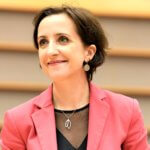 Vanessa Debiais-Sainton is Head of the Unit in charge of Higher Education policies and programme at the European Commission’s Directorate General for Education, Youth, Sport and Culture. The unit is the lead service for European policies on reform and modernisation of higher education, the new European Universities initiative, automatic mutual recognition of higher education qualifications, the EU student card initiative, and the higher education strand of Erasmus+. In previous posts in the European Commission, Vanessa has worked in DG Research and Innovation. Before moving to the European Commission in 2006, Vanessa spent eight years working for several petroleum and chemical companies.
Vanessa Debiais-Sainton is Head of the Unit in charge of Higher Education policies and programme at the European Commission’s Directorate General for Education, Youth, Sport and Culture. The unit is the lead service for European policies on reform and modernisation of higher education, the new European Universities initiative, automatic mutual recognition of higher education qualifications, the EU student card initiative, and the higher education strand of Erasmus+. In previous posts in the European Commission, Vanessa has worked in DG Research and Innovation. Before moving to the European Commission in 2006, Vanessa spent eight years working for several petroleum and chemical companies.
Anna Sadecka
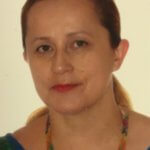 Anna Sadecka is the Deputy Head of the International Relations Office of the University of Warsaw and Head of the Section for EU Educational Programmes. She has over 11-year experience in higher education, including the development and coordination of international educational projects, such as Erasmus Mundus Action 2 or within governmental programmes . She is involved in the works of the Mobility Working Group of the Erasmus+ European Universities project 4EU+, coordinated by Sorbonne University. In addition, she coordinates the project „Academic Partnership for Innovation in Teaching and Learning” (API), sponsored by the Polish National Agency for Academic Exchange (NAWA) within the scheme International Academic Partnerships. Anna graduated from the University of Warsaw, where she studied Pedagogy, American Studies and Social Sciences, and obtained Project Management Certificate form the University of California, Berkeley. She is also engaged in research projects focusing on international education.
Anna Sadecka is the Deputy Head of the International Relations Office of the University of Warsaw and Head of the Section for EU Educational Programmes. She has over 11-year experience in higher education, including the development and coordination of international educational projects, such as Erasmus Mundus Action 2 or within governmental programmes . She is involved in the works of the Mobility Working Group of the Erasmus+ European Universities project 4EU+, coordinated by Sorbonne University. In addition, she coordinates the project „Academic Partnership for Innovation in Teaching and Learning” (API), sponsored by the Polish National Agency for Academic Exchange (NAWA) within the scheme International Academic Partnerships. Anna graduated from the University of Warsaw, where she studied Pedagogy, American Studies and Social Sciences, and obtained Project Management Certificate form the University of California, Berkeley. She is also engaged in research projects focusing on international education.
Olga Wessels
 Olga Wessels is the Head of the Brussels’ office of the European Consortium of Innovative Universities. ECIU is a unique network of consortium of research-intensive universities, with collective emphasis on innovation, creativity and societal impact that exists since 1997. With the ECIU University, the consortium is determined to change the way of delivering education from degree-based to challenge based. ECIU’s proposal to the EU suggests a ground-breaking and innovative educational model on a European scale.
Olga Wessels is the Head of the Brussels’ office of the European Consortium of Innovative Universities. ECIU is a unique network of consortium of research-intensive universities, with collective emphasis on innovation, creativity and societal impact that exists since 1997. With the ECIU University, the consortium is determined to change the way of delivering education from degree-based to challenge based. ECIU’s proposal to the EU suggests a ground-breaking and innovative educational model on a European scale.
In her function, Ms Wessels contributes to setting the agenda of ECIU at the European level, increasing the organisation’s visibility as a strong partner for European institutions and stakeholders in debates about policy and programme developments.
Before joining ECIU, Ms Wessels represented the Dutch universities in Brussels, focussing on higher education and Open Science policies, and worked for the Dutch National Students’ Union (LSVb), focusing on flexible education and quality assurance.
Nina Salden
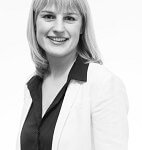 Nina Salden is the Director of the DAAD branch office in Brussels, Belgium. Since 2012 she is representing the German Academic Exchange Service (DAAD) in Brussels vis-à-vis the EU institutions. The DAAD is one of the largest funding organisations for international higher education cooperation (www.daad.de).
Nina Salden is the Director of the DAAD branch office in Brussels, Belgium. Since 2012 she is representing the German Academic Exchange Service (DAAD) in Brussels vis-à-vis the EU institutions. The DAAD is one of the largest funding organisations for international higher education cooperation (www.daad.de).
Before her time in Brussels, Ms Salden has been working for the National Agency for EU Higher Education Cooperation at DAAD headquarters in Bonn, Germany. Ms Salden has joined the DAAD in 2007 as head of unit for South Eastern Europe. Before her time at DAAD, Ms Salden has been working for five years for the International Organization for Migration (IOM) in Brussels.
Ms Salden has studied in Germany, Britain and France and is holding a Master of Science in European Public Policy.

